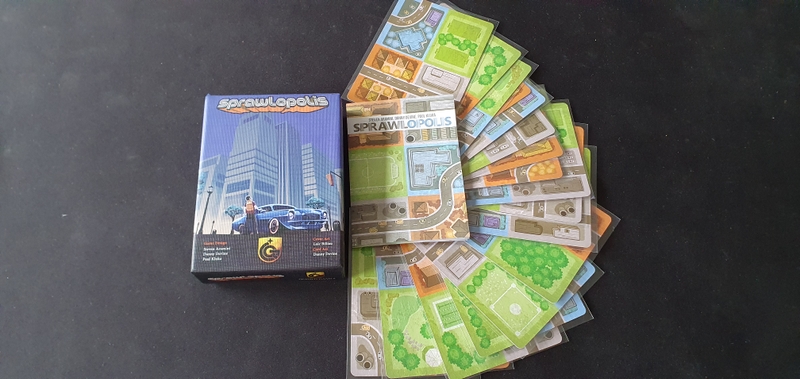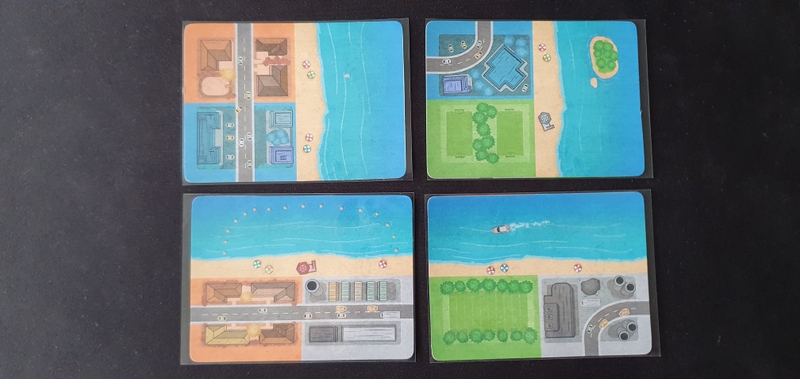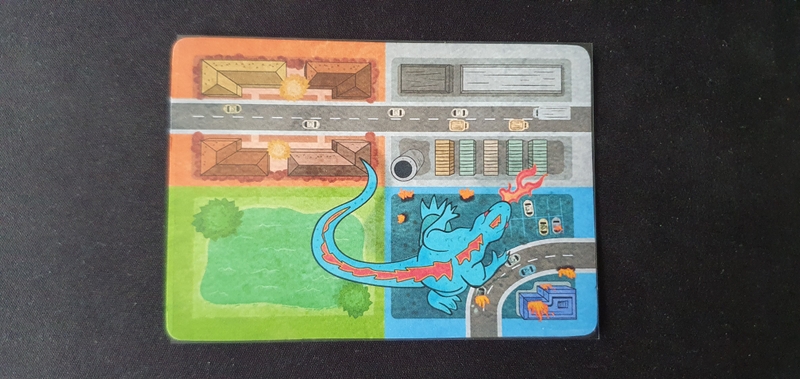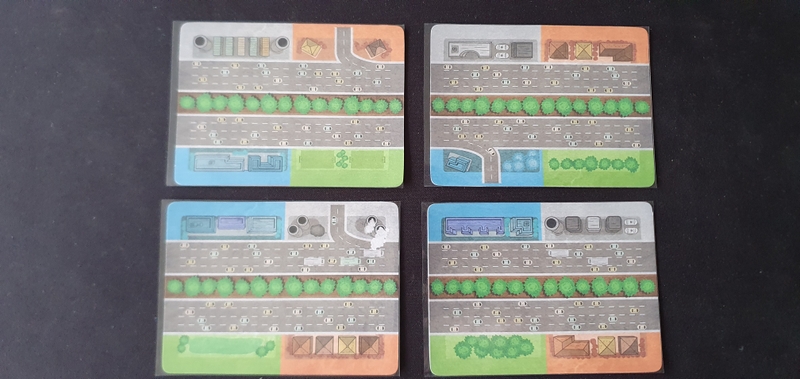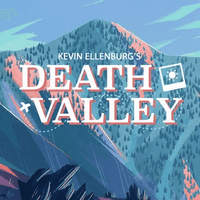I reviewed the Quined Games version that I bought from Zatu Games. I then printed out the expansions from PNPArcade. This review primarily covers the solo mode as it's the recommended and most popular way to play according to the BoardGameGeek community.
Sprawlopolis is the first of the 'opolis' series and just from a few games you will quickly see how it became so popular. Simple mechanics with a ridiculous amount of choices to make results in a satisfying map builder.
Official Description
In Sprawlopolis, 1-4 players work together to build a new city from the ground up. Using only 18 cards and a variable scoring system, the game is never the same twice. Each turn, players will play 1 card from their hand to the growing city, trying to score as many points as possible.
Components
Sprawlopolis like other Button Shy Games, consists of 18 cards. With one side showing a set of four city blocks representing each of the four block types. Along with one or two roads that enter and exit the card on different sides. The other side has a unique scoring condition that is only active when draw as a scoring card at the start of the game. It also comes with scoring pad to help with scoring, though this isn't required.
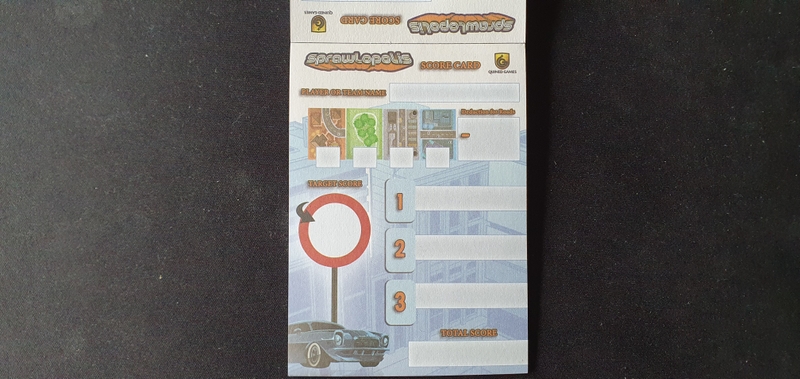 Empty scoring pad with sections to help calculate the score
Empty scoring pad with sections to help calculate the score
Gameplay
In the solo mode you shuffle the deck of cards and draw the top three to act as scoring cards. You use the scoring sides of these cards as your main scoring objective during gameplay. The scoring side includes the target score which get summed up across all active scoring cards to become your target score which if equalled or beaten by your own score then you win. These scoring conditions can sometimes work together well and make it easier or encourage opposite gameplay styles making it harder.
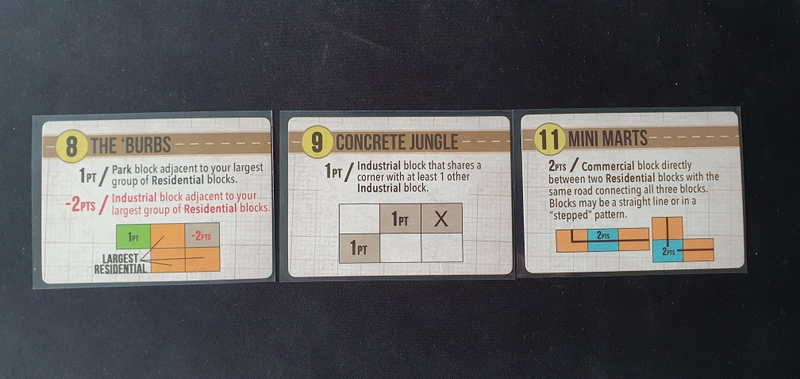 Three randomly selected score cards
Three randomly selected score cards
Next you draw three cards from the deck to become your starter hand. This starts the main gameplay where you play a card from your hand and then draw a new card until all cards have been played. When you play a card it must be placed with an adjacent edge or partially/completely covering an played card (outside of the first turn). This means you slowly build up a city with a layout you choose based upon the randomness of the deck order and the scoring cards you drew. This is very simple to learn while feeling satisfying and giving a huge amount of possible options during gameplay. When you play cards you can also rotate them 180 degrees giving additional options especially when trying to connect roads or building larger groups.
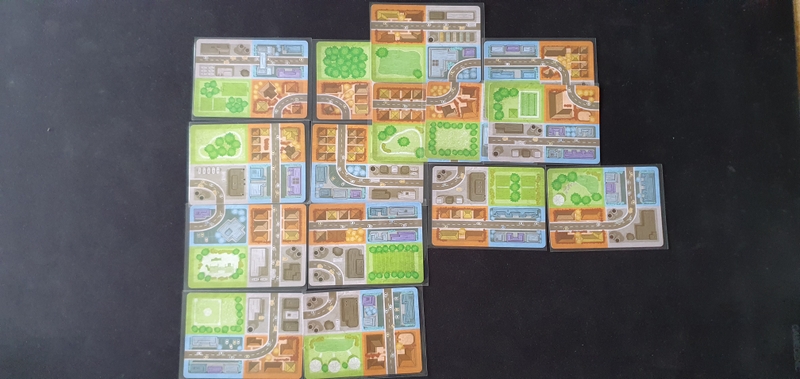 Finished game with all cards used
Finished game with all cards used
Once all cards have been played you start scoring. This involves adding together the number of blocks within your largest group for each group type. Then you minus a score for each separate road, this encourages building a city that makes more thematic real sense with large connected roads and different sections of your city. Next you calculate your score for each active scoring card, this can involve getting adding or minusing points for certain block and road placements.
Once all of your scores have been summed you get your final score. This is then compared to the target score (sum of all active scoring card targets). This gives you a win/loss goal with additional aim of beating your personal best if you happen to have the same scoring cards as a previous game. The scoring makes it easy to see where you made bad decisions and try again with a new strategy. I've found the fascinating strategy wise as many players will approach the same scoring conditions in a completely different way, this is evident if you take part in the solo challenges mentioned further down.
Beaches Expansion
Beaches adds four cards that restrict the area you can build in by creating a horizontal or vertical limit that you cannot build past. This happens during the game by being placed immediately when draw from the deck, this can often ruin your plans and force you to adapt. But offsets this difficulty increase with an additional scoring card also pulled from the beaches cards that focuses on giving you points by achieving certain goals on blocks near the beaches. This is my favourite expansion as it works great thematically and mechanically.
Construction Zones Expansion
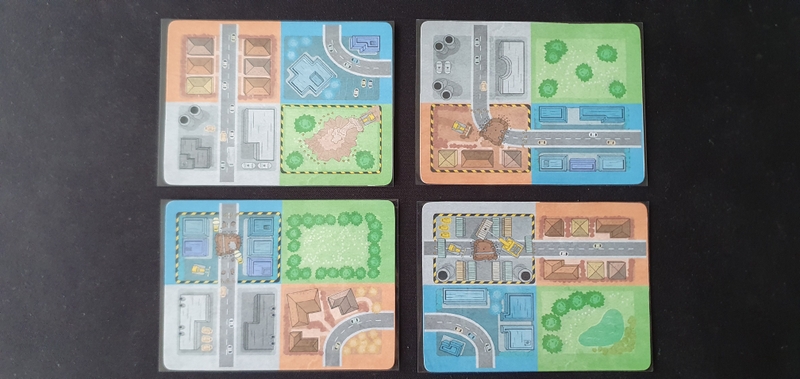 Construction Zones expansion cards
Construction Zones expansion cards
Construction Zones adds four cards that get played during gameplay when they get drawn into your hand. Each card contains a block with construction on, if this block is not covered by the end of the game you additional lose points. Like beaches you also offset this difficulty increase with a scoring card from this expansion. This didn't quite hit the same as Beaches as it felt more annoying than fun, along with not being visible at the end of the game if you covered all construction zones. While after the beaches expansion you can see how the restrictions forced you to adapt.
Point of Interest Expansion
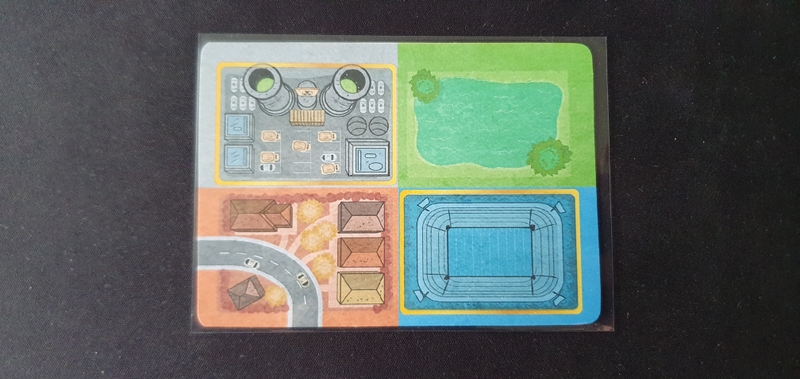 Point of Interest expansion cards
Point of Interest expansion cards
Points of Interest adds a single card that you place first before starting gameplay. Both sides of the card has city blocks so you can choose which blocks would work best with your scoring conditions. The yellow bordered blocks are points of interest that will gain you a point per adjacent block of the same time. This encourages building a central group of the same block type. The expansion adds extra points making the game easier without additional complexity, but I still like sometimes using it because I feel that the game lacks the thematics of special buildings within the city.
Wrecktar Expansion
Wrecktar adds difficulty by including a single card that gets played when it gets added to the hand. This card covers the last card that was played and then reduces the final score if any commercial blocks are in the same row and column. If you avoid doing that you get 3 extra points. While having a Godzilla like creature attacking your city is a great idea, I felt that the mechanics were lacking. Instead I would have preferred additional cards with military blocks that must be placed in the same row and column to take Wrecktar down.
Interstate Expansion
Interstate is the most unique expansion, but works best in multiplayer where you can play versus another player building your own city on your side of the interstate. The interstate is built horizontally with four new cards between both players and includes roads that turn off onto your city. Each interstate card also includes half city blocks at opposite sides these cannot be covered but otherwise act as normal city blocks for scoring.
The issue in the solo mode is that you alternate between building each side of the city. Which I just didn't find fun as splitting up the playable cards limits the size and possible layouts of each side. This expansion does appear to be aimed at multiplayer though, while the others are more player count agnostic.
Other Expansions
I've yet to try the Roadworks expansions, but will update this review once I've done so. The combo expansions are also available to combine Sprawlopolis with Agropolis and Naturopolis. These give a huge amount of additional variety ontop of an already replayable game with from my experience a slightly harder experience.
Solo Challenges
The Button Shy Games' Discord runs regular solo challenges for many of their games. With the 'opolis series have their most active challenges. These require completing a game with specific scoring cards, often with the more complex and difficult challenges.
I've found these fun, though often difficult to play as the challenges mostly focus on the harder scoring card combinations. Each week has a new challenge from any 'opolis game or expansion though, so it is mainly aimed at those with larger 'opolis collections.
